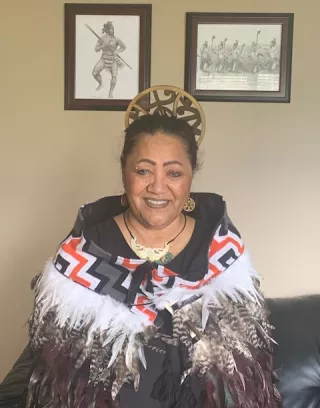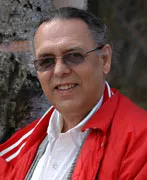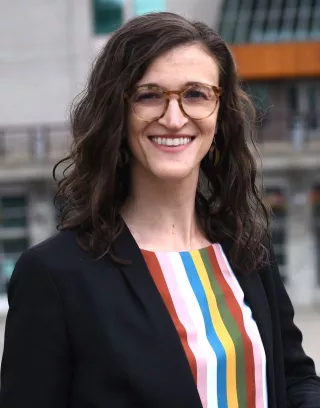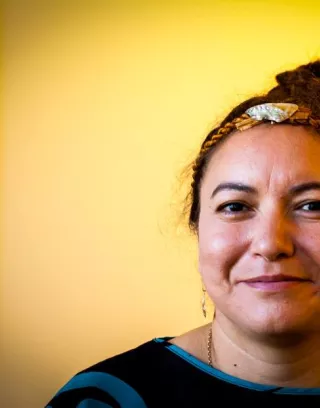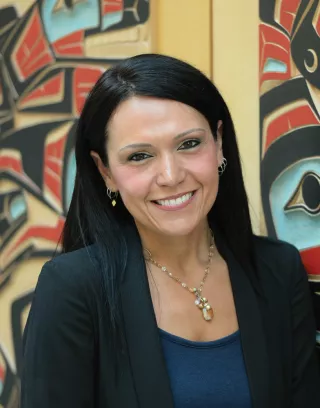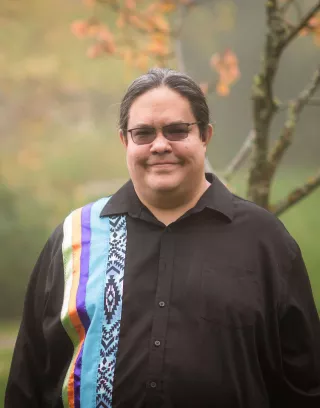Department Chair
PhD Educational Studies (University of British Columbia), MEd Educational Leadership and Administration (Simon Fraser University)
Biography
Dr. Fraser is a Māori scholar from Aotearoa (New Zealand) teaching at the University of Northern British Columbia. Her tribal affiliations are Ngāti Haka/Patuheuheu, Ngāti Koura, and Ngāti Pani from the Tūhoe Nation. The other affiliation is Ngāti Ranginui. Dr.
Faculty
PhD Educational Studies (University of British Columbia), MEd Educational Leadership and Administration (Simon Fraser University)
Biography
Dr. Fraser is a Māori scholar from Aotearoa (New Zealand) teaching at the University of Northern British Columbia. Her tribal affiliations are Ngāti Haka/Patuheuheu, Ngāti Koura, and Ngāti Pani from the Tūhoe Nation. The other affiliation is Ngāti Ranginui. Dr.
Biography
Earl Henderson, is a respected Elder and Veteran living in Prince George. Earl was born and raised in Portage la Prairie Manitoba and is of Cree, Sioux and Métis descent. His cultural teachings are predominantly from his Cree Elders.
Biography
Tara Joly is a 10th generation Euro-Canadian settler and an uninvited guest on the Traditional Territory of the Lheidli T'enneh, where she is grateful to have lived since 2016.
BA, MA - First Nations Studies (UNBC)
Biography
Hadih! Holding the traditional name: Dzih Bhen, in the Luk sil yoo or Caribou clan from the Stellat’enne Bahlats (potlatch) system remains a large part of my life. It is my responsibility to know my culture.
PhD (University of British Columbia), MA (University of Northern British Columbia)
Biography
My name is Dr. Rheanna Robinson. Land acknowledgments are important and I would like to begin by acknowledging the territory of the Lheidli T’enneh Nation where the Prince George campus of UNBC is located and I have had the privilege to live, work, and learn for more than two decades.
PhD, MA, BA
Biography
Born and raised in Prince George, Dr. Daniel Sims is a proud member of the Tsay Keh Dene First Nation. His research focuses on northern British Columbia and he has worked extensively with not only his own community, but also the related communities of Kwadacha and McLeod Lake.
Emerita
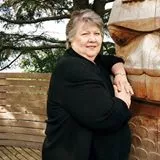
Anderson, Margaret
Professor Emeritus
Phone: 250-624-2650
Email: margaret.anderson@unbc.ca
Margaret Seguin Anderson joined the University of Northern British Columbia in 1992 as Professor of First Nations Studies and the founding Chair of that program. She became Chair of the UNBC Northwest Region in 1994 and has resided in Prince Rupert from that time. She was designated Professor Emerita at UNBC on her retirement, and continues to pursue her research, working with fluent speakers of the Sm'algya̱x language and to develop learning resources with the Ts’msyen Sm'algya̱x Language Authority and School District 52. Margaret authored and edited several books and a number of scholarly articles over her career, and was the principal investigator in a number of large grants from SSHRCC and other granting agencies. She has worked with her Ts’msyen colleagues to develop and maintain the Sm'algyax Living Legacy Talking Dictionary on the web (now available on Webonary). This was the first such multi-media dictionary of an indigenous language in British Columbia. The content of the dictionary database has now also been ported to a Sm'algya̱x site on First Voices. Margaret also co-authored with Marianne Ignace the multi-media resource Visible Grammar: Ts'msyen Sm'algya̱x Grammar Resources - Twenty User-Friendly Modules on Key Ts’msyen Sm'algyax Structures, pioneering the use of coloured "sentence puzzles" to help learners visualize the complex patterns of the language. More recently, working with a team of fluent Sm'algya̱x speakers, she has edited a large collection of Sm'algya̱x texts, largely from the William Beynon Collection from Columbia University. These texts have been rewritten in the contemporary orthography and audio recordings of each revitalized text have been recorded by fluent speakers; this research is ongoing. Examples of the texts and recordings may be found on the website of the Ts'msyen Sm'algya̱x Language Authority. Margaret also continues to teach, focused on sharing her knowledge of the Sm'algya̱x language, which she has added to over the 40+ years since she first started studying the language in Hartley Bay in 1978
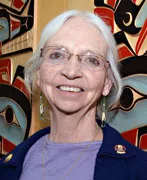
Mills, Dr. Antonia
BA, Ph.D. (Harvard)
Professor Emeritus
Phone: 250-960-6690
Email: millsa@unbc.ca
Mills was previously a Research Assistant Professor and Lecturer at the University of Virginia, USA. She earned her BA from Radcliffe/Harvard, and her PhD from Harvard. First Nations land claims, religion and law, and reincarnation beliefs and cases are her current research interests. She has conducted field work with the Beaver Indians since 1964. Tonia co-edited (with Richard Slobodin) Amerindian Rebirth: Reincarnation Belief Among North American Indians and Inuit (1994), and is the author of Eagle Down is Our Law: Witsutit'en Feasts, Laws and Land Claims, published by UBC Press (1994). This latter book is the result of her spending three years living in Witsuwit'en territory and serving as an expert witness and writing an expert opinion report for the Delgamuukw case. Her booked supported by a SSHRC Grant, "Hang On To These Words: Johnny David's Delgamuukw Testimony" was published by the University of Toronto Press (2005). She has been awarded a Shastri Indo-Canadian Instituted Fellowship for "A Longitudian Study of Young Adults who were said to Remember a Previous Life." She teaches undergraduate and graduate courses and one on "Indigenous Perspectives on Reincarnation and Rebirth" (at both levels). Tonia has also published a variety of journals such as Culture, B.C. Studies, and the Journal of Anthropological Research, and chapters in books.
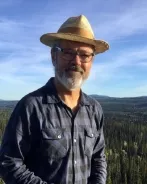
Hoffman, Dr. Ross
BA, MEd, PhD
Professor Emeritus
Email: hoffmanr@unbc.ca
Ross Hoffman completed his PhD in Native Studies at Trent University in 2005. He earned his MEd in Curriculum Studies at the University of Victoria. Ross began his studies in the discipline of Native Studies at Trent University, completing his BA in the mid-1970's. He has worked with Wet'suwet'en, Gitxsan, and Cree communities on a variety of community-based research projects in the areas of education, language and culture, and health and wellness. His broad research interests include studying the relationship between cultural renewal, identity, and healing. An important aspect of his scholarly work is the fact that it rests within both the western academic tradition as well as an Indigenous knowledge tradition. The focus of his scholarly work has been to respect, balance, bridge, and integrate these two epistemological traditions. This ‘dual scholarship’ is possible because he has been blessed with the guidance of Elders within an academic environment as well as in community-based traditional settings. His prolonged study with Elders has provided him, a non-Aboriginal person, with the necessary understanding to conduct respectful, responsible research that is meaningful and valuable both within the discipline of First Nations Studies and within the communities that he works with.
Adjunct Faculty
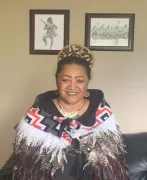
Fraser, Dr. Tina
Adjunct Professor
Phone: 250-960-5714
Email: tina.fraser@unbc.ca
Dr. Fraser is a Māori scholar from Aotearoa (New Zealand) teaching at the University of Northern British Columbia. Her tribal affiliations are Ngāti Haka/Patuheuheu, Ngāti Koura, and Ngāti Pani from the Tūhoe Nation. The other affiliation is Ngāti Ranginui. Dr. Fraser is a full Professor in the School of Education. She is the first female and Indigenous Chair for the School of Education, an Adjunct Professor in the School of Nursing and Adjunct into the Department of First Nations Studies. Dr. Fraser is a Fellow of Te Mata Ō Te Tau (The Academy for Research and Scholarship at Massey University, and an Associate Fellow/Adjunct at Te Wānanga ō Awanuiarangi, New Zealand. In her previous role, she was the ActNow British Columbian (BC) Initiatives Research Manager and the Cultural Advisor to the National Collaborating Centre for Aboriginal Health, Centre of Excellence for Adolescence and Children with Special Needs, and the Network Environments for Aboriginal Research BC. Dr. Fraser has a Nursing background, Early Childhood Education, Master of Educational Leadership and Administration, (Simon Fraser University, Canada), and a Doctor of Philosophy in Educational Studies from the (University of British Columbia, Canada). She, along with colleagues provincially, nationally, and internationally have published articles and chapters in Early Childhood Education, First Nations, and Indigenous Knowledge(s), Mātauranga Māori and Global Knowledges, Indigenous Technology and Education, Health and Wellness, and the Mindfulness through Indigenous practices, and recently co-written and submitted an article to International Journal of Qualitative Methods, and recently published. I Am Not Represented Here: Cultural Frameworks and Indigenous Methodology Primer for Postsecondary Settings. She is the co-editor of Living Indigenous Leadership: Native Narratives on Building Strong communities. Dr. Fraser is the only International academic external examiner for dissertations written in Te Reo Māori (Māori Language) for New Zealand institutions. She also supervises students/ practitioners and evaluates He Waka Hiringa Applied Indigenous Knowledge Masters’ degree at Te Wānanga ō Aotearoa, an examiner for Waikato University (NZ), Victoria University (NZ) as well, she is a stakeholder on the board of Te Wānanga o Aotearoa University, New Zealand.

Henderson, Earl
Adjunct Professor
Connection to Culture and Community Leadership: Earl Henderson is a respected Elder in the Prince George community and is of Métis/Cree descent. He is a pipe carrier practicing both contemporary and traditional methods of healing. In this role, he has led training on traditional cultural practices and cultural competency for a number of groups and organizations, including Iyiniwak Traditional Healing & Medicines Gathering, Kikino Métis Children and Family Services, Northern Health Youth Services, Carrier Sekani Family Services, University of Northern British Columbia, Métis Annual General Meeting Elders Gathering, College of New Caledonia Nursing Program, MCFD, Prince George Youth Custody, UBC Aboriginal Graduate Symposium, Central Interior Native Health Society, Project Parent North, Positive Living North, Halfway River First Nation, and Lheidli Tenneh First Nation. He has been involved in incorporating traditional cultural practices into BC corrections facilities. His sessions are based on the Aboriginal holistic approach to wellness, including teachings about the medicine wheel, sweat lodge, pipe ceremony, circles, traditional health and healing, loss and grief, traditional medicines, ethics and confidentiality, impact of residential schools, and connection between past and future (Aboriginal worldview). Earl brings his role as an Elder to the Cedar Project to advise and guide the study's direction. He has held regular sweats with community, and Cedar Project participants are invited to attend.
Community Counseling: In his over 25 years as a counsellor Earl has worked with both Aboriginal and non-Aboriginal clients. In 1999 he received a Social Services Foundation (Pre BSW) Diploma from College of New Caledonia. Before, during and after his studies he worked as an Aboriginal Therapist at Apehtaw Kosisan Métis Child & Family Support Society. In 2000, he worked as a counsellor, group facilitator/cultural advisor at Orman Lake Healing Camp for Carrier Sekani Family Services. Since 2008 Earl has taught an Indigenous counselling course biannually for UNBCs M.Ed. Counselling program both locally in Prince George and at satellite campuses in Terrace and Fort St. John. From 2011-2012 he worked for the Aboriginal Child &Youth Wellness team at the Prince George Native Friendship Centre.
Leadership in Research and Education: After an interdisciplinary Masters of Anthropology, Education and First Nation Studies in 2008 focusing his thesis on "Listening to the Spirit Voices: Honoring Our Traditional Ways of Healing," Earl began teaching in the First Nations Studies program at UNBC. He has helped develop curriculum and introduced students in health professions to Indigenous worldviews. Earl has been directly involved with several Aboriginal research initiatives. He continues to be involved with the Cedar Project as an Elder. Since 2005 he has been involved in various projects including Knowledge Translation (UNBC), Métis Health (UBC Kelowna), Cultural Competency & Safety (College of the Rockies Cranbrook) and The Island Cache Research. Cultural Healing for Youth in Corrections: Earl’s involvement with the justice system began in 1987 as a Federal Parole officer. Since the 1990s, he has been bringing cultural teachings to youth and adults involved in corrections. For example, Earl has facilitated talking circles at KetsoYoh Men's Hostel and Halfway House and St. Patrick's Transition House in Prince George. Currently he contracts with the Prince George Youth Custody Centre and works with staff and youth integrating Aboriginal culture, ceremonies, and protocols into its programs. He also works directly with youth in corrections by holding sweats, pipe ceremonies, talking circles, feasts, and other traditional activities. Earl notes that some Aboriginal youth in corrections say that this is the first time they've been able to connect with their culture and gain pride in their First Nations identity. Earl has also been involved in gang prevention for Aboriginal youth by facilitating workshops for the Walk Tall Program (Carrier Sekani Family Services) this program uses connection to culture to prevent gang involvement among young people. In 2011, Earl facilitated two Tipi teaching workshops for youth at risk that focused on the values attached to each pole and the tipi structure in relation to individuals, families and communities.
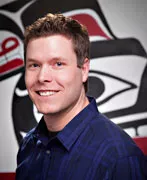
Holyk, Dr. Travis
Adjunct Professor
Dr. Travis Holyk, Beeskih, is currently the Executive Director of Research, Primary Care and Strategic Services at Carrier Sekani Family Services, an organization responsible for health and social programming for eleven member First Nations in North central BC. Travis has been a leader in developing and administering innovative health and social programs that continue to have a positive and lasting effect in First Nations communities. He has overseen the research, implementation, and administration of programs such as Family Justice and Intensive Family Preservation. Thanks to his efforts families and communities now benefit from these services, which are designed to support a families’ capacity to care for their own children, and reduce the number of children in care. Travis oversees all quality assurance, accreditation and program evaluations at CSFS, thereby ensuring that all programs and services continue to evolve and meet their intended outcomes. He penned the CSFS Research Ethics policy and has been involved in research ethics for over a decade. Travis also administers an innovative model of primary care across an expansive geography, and has been guiding those services towards an interdisciplinary approach to wellness. As a lead researcher, and adjunct faculty member at UNBC, Dr. Holyk has coordinated multiple research projects, all of which have informed and improved services for First Nations communities. Some of the projects include: Educational Assessment, the role of traditional foods in dietary habits of Carrier Sekani communities, suicide prevention, health administration, bioethics and Child Welfare Governance. Publications include journal articles focused on First Nations’ trust of the medical system, youth suicide, parents’ understanding of the school assessment system and traditional forms of dispute resolution as well as a book chapter on youth suicide.
McCreary, Tyler
Adjunct Professor
In addition to being an Adjunct Professor in First Nations Studies at UNBC, Tyler McCreary is an Associate Professor of Geography at Florida State University (FSU). He is also affiliated to the Native American and Indigenous Studies Center, African American Studies Program, and Honors Program at FSU. His research examines how settler colonialism and racial capitalism shape processes of environmental, labour, and community governance in North America. His research has analyzed themes such as how North American environmental governance processes address Indigenous concerns; how Indigenous territorial claims impact resource sector labour markets; and how urban and regional governance processes reproduce the historic marginalization of Indigenous families living in towns and cities. He has authored over forty peer-reviewed articles and book chapters. He has also written or edited four books. His first book, "Shared Histories: Witsuwit’en-Settler Relations in Smithers,
British Columbia, 1913-1973" (Creekstone Press, 2018), won the British Columbia Lieutenant Governor's Medal for historical writing and the Prince George Library Jeanne Clarke Award for regional history. His most recent book, “Indigenous Legalities, Pipeline Viscosities: Colonial Extractivism and Wet’suwet’en Resistance,” is being released in early 2024 by University of Alberta Press.

Nyce, Dr. Deanna
B.Ed.,M.Ed.,PhD Interdisciplinary
Adjunct Professor
Email: nyce1@unbc.ca
Deanna Nyce has a Bachelor's Degree in Education as well as a Master's Degree in Educational Administration. Her research and publications have provided a template for Aboriginal curriculum development. Deanna has advocated for Aboriginal education with the BC Ministry of Education and has been a guest lecturer/instructor at many BC education institutions. Deanna, like the elders, felt that their people's future success depended on the education of their youth. Deanna was one of the five key figures in the creation of the Wilp Wilxo'oskwhl Nisga'a (Nisga'a university-college) and its affiliation agreement with UNBC. As CEO of Nisga'a university-college, she oversees the operation of the institution, is responsible for educational planning and programming, and fostering affiliations with other post secondary institutions for program delivery in the Nass Valley.
In September 2004, Deanna was the recipient of the Aboriginal Woman of Distinction Award and the Forging of our Future with Education Award.
Deanna is celebrating 25 years with FNST at UNBC!
Sessional Instructors
Neilson, Leona
Instructor
Phone: 250-960-5545
Email: leona.neilson@unbc.ca
Leona is a Culture teacher for the Headstart program at the Native Friendship Centre. She has been in this position for a number of years. Leona has been teaching Cree Language at UNBC since 1996. She also teaches Cree Language to Elders and to children in the community. As well, she teaches Cree culture and language to elementary and high schools within the community. She also teaches about traditional plants and the way in which they can be utilized for medicinal purposes.
Leona has a diverse and versatile knowledge of making traditional crafts such as moccasins, dream catchers, drum making, rattles, and ribbon skirts.
Leona is from the Cree Nation and a mother of two daughters and also a proud grandmother of three grandchildren.
